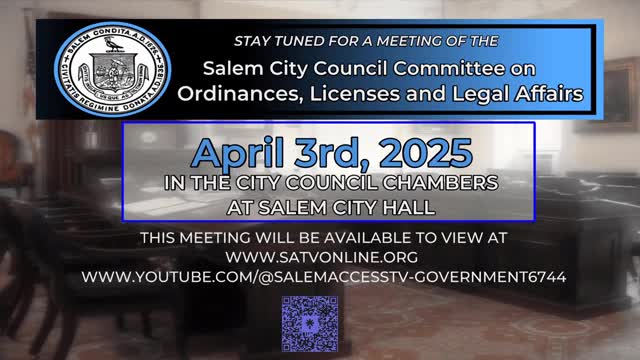Salem committee amends water ordinance to match state drought tiers; refers measure to full council
Get AI-powered insights, summaries, and transcripts
Subscribe
Summary
The Salem City Council committee voted to add language letting the city engineer set weekly outdoor-watering days and referred an amended ordinance aligning local restrictions with the state's Water Management Act to the full council with a positive recommendation.
The Salem City Council Committee on Ordinances, Licenses and Legal Affairs voted Thursday to add language to a proposed ordinance that aligns the city's outdoor water-use restrictions with the state's Water Management Act and referred the amended ordinance to the full council with a positive recommendation.
City officials said the change makes Salem’s irrigation rules follow the state-declared drought level and gives the city engineer authority to set and enforce restrictions when the state or region declares drought.
James Whelan, an attorney for the City of Salem, told the committee the changes are “just to come into compliance with the state standard for water management,” adding that the state or its designee will notify the city of drought level and the ordinance will align local restrictions with that announced level rather than rely on a city employee’s independent drought designation. Giovanna Rosino, water/sewer engineer in the City Engineering Department, described the tiered restrictions the regulation requires: at level 1 (mild drought), nonessential outdoor water use is limited to one day per week; level 2 bans most nonessential outdoor use except handheld watering for ornamental flowers and drip irrigation; and levels 3 and 4 prohibit nonessential outdoor water use entirely.
Committee members questioned the ordinance’s initial approach of assigning one watering day per ward — for example, “Sunday ward 1, Monday ward 2” — and debated whether that ward-by-ward schedule would be equitable or enforceable. Rosino said the one-day-per-week requirement is from the regulation and her team initially assigned days to the city’s seven wards “to give people a specific day of the week.” Several councilors argued that fixing days in the ordinance would make future adjustments difficult and suggested moving the specific schedule into an engineering department regulation.
Deb Duhamel, City Engineer, told the committee the city is required to implement the restrictions under state rules: “Yes, we are mandated to enforce this ordinance per the state regulations.” Committee members pressed for clarity on enforcement steps; staff said the department intends to use an education-first approach similar to other code enforcement: verbal notice followed by a written notice explaining the mandate, then additional enforcement for repeated violations.
Members also discussed communications and signage. Staff described plans for permanent, changeable entry signs with color-coded levels and for coordinated messaging including a press release, a CodeRED alert, and website updates. Councilors suggested additional outreach such as a mailer with the water rules and neighborhood-level notices timed with street-sweeping or other regular communications.
After discussion, the committee approved a motion to add language specifying that the one-day-per-week allowance be set by the city engineer (or by engineering department regulation) and then voted to refer the amended ordinance to the full City Council with a positive recommendation. Councilor Cohen moved the referral; the motion was seconded and carried. The committee also closed the meeting by approving a motion to adjourn.
The ordinance change is intended to ensure Salem complies with state drought-management requirements; staff said some related appeals remain pending at the state level and that implementation details — including the precise watering-day schedule — will be finalized by the engineering department and communicated to residents before the ordinance goes to the full council.
